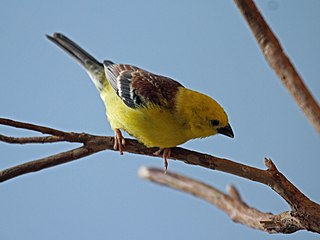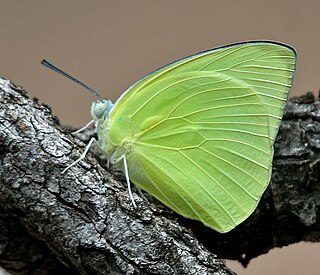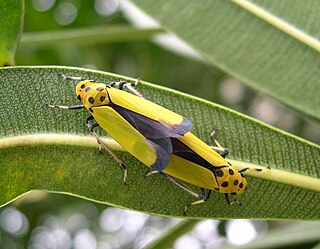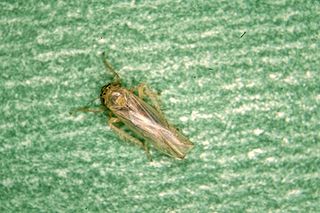
The glassy-winged sharpshooter is a large leafhopper, similar to other species of sharpshooter.

The Sudan golden sparrow is a small species of bird in the sparrow family found in sub-Saharan Africa. It is a famous cage bird, and in aviculture, it is known as the golden song sparrow. The Arabian golden sparrow and this species are sometimes considered one species, as the "golden sparrow".

Leafhopper is the common name for any species from the family Cicadellidae. These minute insects, colloquially known as hoppers, are plant feeders that suck plant sap from grass, shrubs, or trees. Their hind legs are modified for jumping, and are covered with hairs that facilitate the spreading of a secretion over their bodies that acts as a water repellent and carrier of pheromones. They undergo a partial metamorphosis, and have various host associations, varying from very generalized to very specific. Some species have a cosmopolitan distribution, or occur throughout the temperate and tropical regions. Some are pests or vectors of plant viruses and phytoplasmas. The family is distributed all over the world, and constitutes the second-largest hemipteran family, with at least 20,000 described species.

The Auchenorrhyncha suborder of the Hemiptera contains most of the familiar members of what was called the "Homoptera" – groups such as cicadas, leafhoppers, treehoppers, planthoppers, and spittlebugs. The aphids and scale insects are the other well-known "Homoptera", and they are in the suborder Sternorrhyncha.

Catopsilia pomona, the common emigrant or lemon emigrant, is a medium-sized pierid butterfly found in Asia and parts of Australia. The species gets its name from its habit of migration. Some early authors considered them as two distinct species Catopsilia crocale and Catopsilia pomona.

The Mymaridae, commonly known as fairyflies or fairy wasps, are a family of chalcidoid wasps found in temperate, subtropical, and tropical regions throughout the world. The family contains around 100 genera with 1,400 species.

The nelicourvi weaver is a species of bird in the family Ploceidae. It is endemic to Madagascar. Together with its closest relative, the sakalava weaver, it is sometimes placed in a separate genus Nelicurvius. A slender, sparrow-like bird, it is 15 cm (5.9 in) long and weighing 20–28 g (0.71–0.99 oz). Breeding males have a black bill and head, brown eyes, yellow collar, grey belly, chestnut-brown lower tail coverts, olive back, and blackish flight feathers edged greenish. Non-breeding males have mottled grey and green heads. In the breeding female the front of the head is yellow and the back olive green, with a broad yellow eyebrow. It builds solitary, roofed, retort-shaped nests, hanging by a rope from a branch, vine or bamboo stem, in an open space. It primarily feeds on insects, looking on its own or in very small groups, often together with long-billed bernieria. Its natural habitat is subtropical or tropical moist lowland and mountain forests. The conservation status of Nelicourvi weaver is least concern according to the IUCN Red List.

Graphocephala coccinea is a meadow and woodland-dwelling species of brightly colored leafhopper native to North and Central America, from Canada south to Panama. Common names include candy-striped leafhopper, red-banded leafhopper, scarlet-and-green leafhopper and red-and-blue leafhopper.

Graphocephala is a large genus of leafhoppers, found from southern Canada to northern South America.

Palaeovespa is an extinct genus of wasp in the Vespidae subfamily Vespinae. The genus currently contains eight species: five from the Priabonian stage Florissant Formation in Colorado, United States, two from the middle Eocene Baltic amber deposits of Europe, and one species from the late Paleocene of France.
Empoasca onukii, the tea jassid, is an insect species belonging to the subfamily Typhlocybinae of the family Cicadellidae. Plant hosts include Gossypium (cotton) species and, notably, Camellia sinensis. The species is distributed throughout East, Southeast, and South Asia.

Cicadellinae is a leafhopper subfamily in the family Cicadellidae.

Eublaberus distanti, known as the Six-spotted cockroach, Four-spotted cockroach, Four-spot cockroach, or Trinidad bat-cave cockroach, is a primarily cave-dwelling Central and South American cockroach of the genus Eublaberus and named after William Lucas Distant.

Macrosteles quadrilineatus, the aster leafhopper or six-spotted leafhopper, is a leafhopper species in the genus Macrosteles, found in the United States. It is the vector of aster yellows disease, which affects various vegetable plants, weeds and ornamental plants.

Japananus hyalinus, the Japanese maple leafhopper, is a species of leafhopper of the subfamily Deltocephalinae and tribe Opsiini. Believed to be native to eastern Asia, it has been carried with the trade in cultivated maples and is now widely found in Europe, North America and Australia.

Carystoterpa fingens, commonly known as the variegated spittlebug, is a spittlebug of the family Aphrophoridae. It is endemic to New Zealand.

Graphocephala versuta is a species of sharpshooter in the family Cicadellidae.
Barolineocerus is a genus of leafhoppers in the family Cicadellidae.
Amrasca biguttula, commonly known as the cotton jassid, is a subspecies of leafhopper belonging to the subfamily Typhlocybinae of family Cicadellidae. It is a pest of cotton, okra, and other crops in southern Asia and West Africa.

Balcanocerus fitchi is a species of typical leafhoppers.
















